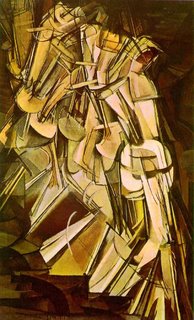 So what's your opinion: Good art, bad art, or "an explosion in a shingle factory"? Or would you prefer this nude descending a staircase?
So what's your opinion: Good art, bad art, or "an explosion in a shingle factory"? Or would you prefer this nude descending a staircase?As they say in exam questions, please back up your answer.
LINK: Nude Descending a Staircase - Wikipedia
The Armory Show - University at Buffalo
RELATED: Art
7 comments:
Where are the boobies?
Actually, I think it's a wooden sculpture of Helen Clark.
It shattered whilst descending the stairs due to no Resource Consent, and suffering from "Leaky Statue Syndrome".
For me, it's good art. Now, to back up my response.
First, I love the "under construction" aspect. It's a bit like watching the screen as my computer renders all the layers of infrastructure for a city street map.
Second, it's like watching a person walking down the stairs through the corner of your eye - or the bottom of a pint glass. You don't notice the face or details. It's the movement of an arm, the tilt of the head, the way the toes angle down to the next step.
I rate is as good art because you could hang it on the wall and it would look pretty good. It would also be a talking point. You could say, "Hey waddya think of my nude walking down the stairs picture?" Your guest would look at it for a while and say something like, "it's clever".
It's an abstract painting that makes sense - like a bridge between the modern and old.
Thank you, PC.
The first time I saw this painting, I was awestruck. It remains (for me) one the canonical masterpieces in all art. Although considering his other efforts, Duchamps is a bit of one-hit wonder, imo.
Good art? Yes.
It represents one of art's great, eternal themes: the nude. The "human body" is depicted in photography, painting, sculpture & literature right throughout Western history, through the Greco-Roman tradition, all the way back into pre-history (if you consider Venus of Willendorf 'art').
Duchamps presents this archetypal subject in a fresh, imaginative way that perfectly embodies the rebellious 'futurist' spirit of the time and its deliberate rejection of tradition.
While not the first to superimpose 'fractured' fragments of images; his inclusion of 'movement' - recording multiple moments of time - is stunningly innovative. Although today's mass exposure to cartoon, sketches, computer graphics, etc (not to mention TV images) may have dulled its originality. Also, it seems fitting that a cubist painting, with its harsh monochromatism, should be rendered in a 'flesh-tone'.
Good art should also (imo) demonstrate a high degree of talent or craftmanship. Unlike, say, a Pollock or Rothko (where you can spill a can of paint and call it 'art'), this painting obviously took effort, skill, and a level of technique beyond the layman.
Would it kick off a firestorm today?
Only of derision. If exhibited today, critics would scoff: "Oh, just another painter having a retro-Picasso moment." But never mind them, good art has a universal appeal that touches people regardless of background, education or belief.
And good art outlives its creator; retaining power to move and thrill tomorrow's generations. A near century since first revealed, on the other side of the world, The Nude electrified me on first discovery, quite unexpectedly just flipping through a book. I'm sure this imaginative, eye-catching representation of a completely mundane event (someone descending stairs) will delight the masses well in to the future.
Oops, I mean "Duchamp"
Dang foreigners with their hard to spell names! ;-)
Number two, definitely.
Post a Comment